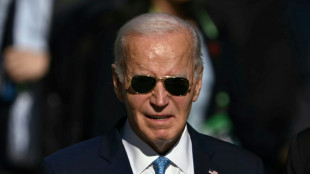Israel's Netanyahu on cusp of victory with far-right allies
Veteran Israeli hawk Benjamin Netanyahu appeared on the cusp of returning to power Wednesday, with initial election results showing his alliance with the extreme right taking a narrow lead.
With around 87 percent of the vote counted, according to the Central Elections Committee, initial results put Netanyahu's right-wing bloc ahead after the country's fifth election in four years.
Addressing supporters who chanted "King of Israel", Netanyahu, Israel's longest-serving leader, said his Likud party had received "a huge vote of confidence".
Caretaker Prime Minister Yair Lapid -- the architect of the coalition which ousted Netanyahu last year -- cautioned that "nothing is decided".
"(We) will wait patiently... for the final results," he told crowds backing his centrist Yesh Atid party.
While Israelis are split broadly between those who support or oppose Netanyahu, the former premier has been buoyed by votes for his extreme-right allies.
The Religious Zionism bloc of Itamar Ben-Gvir has made major gains and was emerging as the third-largest party, behind Yesh Atid.
The controversial Ben-Gvir heralded the party's showing as a "great achievement", which is expected to hand the right-wing a majority in the 120-seat parliament.
- Wafer-thin -
Despite Israel's election fatigue, voters came out in force and pushed turnout to its highest rate since 2015, topping 71 percent, according to official figures.
The margins appear wafer-thin, however, with a number of smaller parties opposed to Netanyahu teetering on the edge of the threshold required to win seats in parliament.
"It is too early to speculate on the exact composition of the next governing coalition until all the votes are counted," the US ambassador to Israel Thomas Nides said in a statement, adding he was "pleased to see such strong voter turnout."
The early signs were positive for the 73-year-old Netanyahu, who is on trial on corruption charges that he denies.
The official count put his Likud on track for a first-place finish, with 32 seats, ahead of Yesh Atid's 24.
Those figures, combined with current tallies for Religious Zionism and the two ultra-Orthodox Jewish parties backing Netanyahu, could give the right-wing bloc 65 seats.
Such an outright victory would end the short reign of the motley coalition, which succeeded in ending Netanyhau's record reign last year.
Yael Shomer, who teaches politics at Tel Aviv University, said final results could rest on the outcome of just "a few thousand votes".
- 'Masters of our country' -
Whatever the final result, Ben-Gvir was described as "the big winner of this election" by politics lecturer Julia Elad-Strenger from Israel's Bar-Ilan University.
"He took from the haredim (ultra-Orthodox), from the Likud, of course new young voters and people who had no one to vote for," Elad-Strenger said.
The tireless campaigning of Ben-Gvir could see his alliance more than double its current presence in parliament, picking up 14 seats.
The 46-year-old, who has his eye on the public security portfolio, wants Israel to use more force against Palestinians.
"It's time we go back to being masters of our country," Ben-Gvir said following the vote.
Arab-Israeli lawmaker Aida Touma-Suleiman said Netanyahu might be on track to form a government "with fascists by his side".
The vote was held against a backdrop of soaring violence across Israeli-annexed east Jerusalem and the occupied West Bank.
At least 29 Palestinians and three Israelis were killed in the territories in October, according to an AFP tally.
As the votes were being counted on Wednesday, Israeli troops killed a Palestinian that the army said seriously wounded a soldier with a van in the West Bank.
While many candidates cited security as a concern, none pledged to revive moribund peace talks with the Palestinians.
Palestinian prime minister Mohammad Shtayyeh said the projected results highlighted "growing extremism and racism in Israeli society".
- Arab-Israeli parties split -
The coalition led by Lapid was formed by bringing an Arab party into the fold, after Mansour Abbas pulled his Raam party from a united slate with other Arab-led parties.
But Raam's pioneering support for a coalition was not viewed positively across Arab society, which makes up around 20 percent of Israel's population.
For Shomer, from Tel Aviv University, the anti-Netanyahu bloc crucially failed to ensure alliances of smaller left-wing and Arab-led parties ahead of the vote.
In left-leaning Tel Aviv, 24-year-old voter Lauren Vaturi Moses said she woke up hoping Netanyahu had lost his advantage.
"When I read that he was leading and that this is what was taking shape, it completely depressed me," she said.
A.Kenny--MP




